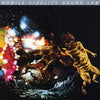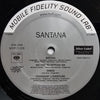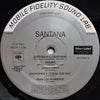









Santana III (MOFI Silver Label, Ultra Analog)
ORDER LIMITED TO ONE ITEM PER CUSTOMER
Guitar, Vocals – Carlos Santana [click here to see more vinyl featuring Carlos Santana]
Piano, Organ, Vocals – Gregg Rolie
Vocals – Rico Reyes (B2)
Backing Vocals – Rico Reyes (B5)
Backing Vocals, Percussion – Coke Escovedo
Backing Vocals – Linda Tillery (B4)
Bass – David Brown
Guitar – Neal Schon
Congas, Vocals, Percussion, Tambourine – Michael P. R. Carabello
Drums, Percussion, Vibraphone – Michael Shrieve
Timbales, Congas, Percussion, Vocals, Drums, Flugelhorn – Jose Chepito Areas
Backing Vocals – Rico Reyes (A2, A4)
Tambourine – Gregg Errico (A2)
Backing Vocals – Linda Tillery (B1)
Horns – Tower Of Power Horn Section (B1)
Piano – Mario Ochoa (B2)
Trumpet – Luis Gasca (B5)
Written by Carlos Santana (A4, B1, B4), José Areas (A1, A3-4, B2), David Brown (A1, A4, B2), Michael Carabello (A1-2, A4), Gregg Rolie (A1-4), Michael Shrieve (A1, A4), Coke Escovedo (A2), Milton Brown (B1), Tyrone Moss (B1), Rico Reyes (B2), Tito Puente (B5)
1LP, gatefold jacket
Limited numbered edition
Original analog Master tape : Silver Label (Copy of original Mastertape)
Heavy Press : 180g
Record color : black
Speed : 33 RPM
Size : 12'’
Stereo
Studio
Record Press : RTI
Label : MOFI
Original Label : Columbia
Recorded January – July 4, 1971 at Columbia Studios, San Francisco
Recordeded by Mike Larner
Engineered by Glen Kolotkin (A1-4, B1, B4-5), D. Brown (B2-3)
Produced by Santana Musicians
Originally released in September 1971
Reissued in 2013
Tracks:
Side A:
- Batuka
- No One To Depend On
- Taboo
- Toussaint L'Overture
Side B:
- Everybody's Everything
- Guajira
- Jungle Strut
- Everything's Coming Our Way
- Para Los Rumberos
Reviews :
“Santana III is an album that undeservingly stands in the shadows behind the towering legend that is the band's second album, Abraxas. This was also the album that brought guitarist Neal Schon -- who was 17 years old -- into the original core lineup of Santana. Percussionist Thomas "Coke" Escovedo was brought in to replace (temporarily) José Chepitó Areas, who had suffered a brain aneurysm, yet who recovered quickly and rejoined the band. The rest were Carlos, organist Gregg Rolie, drummer Michael Schrieve, bassist David Brown, and conguero Michael Carabello. "Batuka" is the powerful first evidence of something being very different. The band was rawer, darker, and more powerful with twin leads and Schon's harder, edgier rock & roll sound paired with Carlos' blend of ecstatic high notes and soulful fills. It cooks -- funky, mean, and tough. "Batuka" immediately transforms itself into "No One to Depend On," by Escovedo, Carabello, and Rolie. The middle section is highlighted by frantic handclaps, call-and-response lines between Schon and Rolie, and Carlos joining the fray until the entire track explodes into a frenzied finale. And what's most remarkable is that the set just keeps on cooking, from the subtle slow burn of "Taboo" to the percussive jam workout that is "Toussaint l'Overture," a live staple in the band's set list recorded here for the first time (and featuring some cooking Rolie organ work at its beginning). "Everybody's Everything" is here, as is "Guajira" and "Jungle Strut" -- tunes that are still part of Santana's live show. With acoustic guitars, gorgeous hand percussion, and Santana's fragile lead vocal, "Everything's Coming Our Way" is the only "feel good" track here, but it's a fitting way to begin winding the album down with its Schon and Santana guitar breaks. The album ends with a completely transformed reading of Tito Puente's "Para los Rumberos," complete with horns and frantic, almost insanely fast hand drumming and cowbell playing. It's an album that has aged extremely well due to its spare production (by Carlos and the band) and its live sound. This is essential Santana, a record that deserves to be reconsidered in light of its lasting abundance and vision.” AllMusic Review by Thom Jurek
Ultra Analog™ : The GAIN 2 Ultra Analog™ Series stems from the use of the Gain 2 system, mastered at half speed from the original master tapes where possible, capturing and uncovering as before undiscovered sonic information.
Half-speed mastering. In half-speed mastering, the whole process is slowed down to half of the original speed. A typical 33 1/3 rpm record is cut at 16 2/3 rpm. The source material is also slowed down (reducing the pitch in the process) meaning the final record will still sound normal when played back. Slowing the whole process down allows more time, which means the end result sounds better and is more efficient — allowing engineering to minimize the effects of inherent limitations within the vinyl format. The result is a more accurate and more open high-frequency response in the half speed vinyl when compared with a normal speed recording.
Ratings :
Discogs : 4.6 / 5 ; AllMusic : 4.5 / 5




